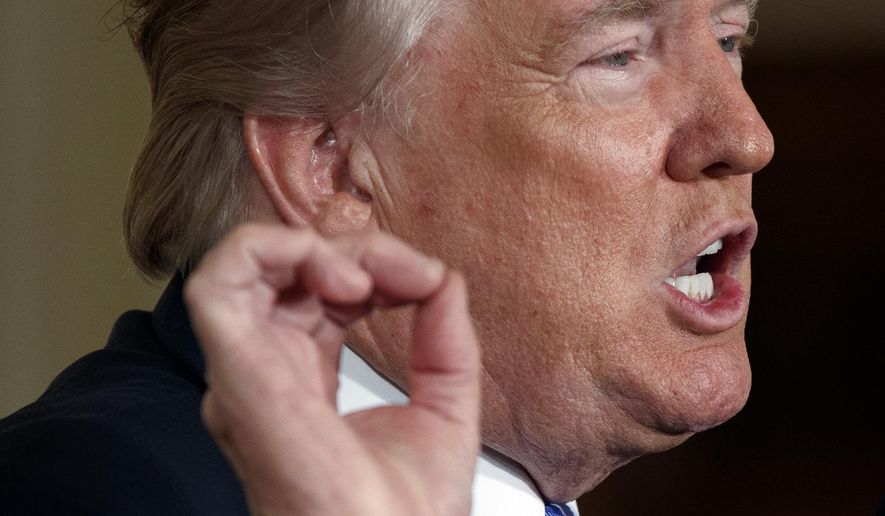President Trump promised to shake up Washington, but he’s following at least one swampy tradition by nominating wealthy political allies and campaign donors to cushy ambassador posts.
While presidents typically dole out about 30 percent of U.S. ambassadorships to political appointees, Mr. Trump through Friday had awarded 14 of his first 19 ambassador posts to political nominees rather than career foreign service professionals.
They include San Diego hotelier Doug Manchester, nominated for the very pleasant assignment of ambassador to the Bahamas. Mr. Manchester was one of Mr. Trump’s early political backers; he and his wife, Geniya, each gave $454,800 to political committees supporting Mr. Trump’s campaign.
George E. Glass of Oregon, founder of Pacific Crest Securities, is Mr. Trump’s choice to become ambassador to Portugal. He donated $33,400 to the Republican National Committee in July 2016 and gave $22,500 to Mr. Trump’s inaugural committee.
Kelly Knight Craft, wife of billionaire coal magnate Joe Craft and a major Republican Party donor, has been nominated by the president for ambassador to Canada.
Mr. Trump also nominated Robert “Woody” Johnson IV, owner of the New York Jets, to the coveted post of ambassador to the Court of St. James in London. Mr. Johnson, an heir to the Johnson & Johnson pharmaceutical empire, was a top fundraiser for Mr. Trump and for the presidential inauguration.
Lewis Eisenberg, finance chairman of the Republican National Committee who helped to oversee Mr. Trump’s general-election fundraising, is reportedly the leading choice for the ambassadorship to Italy.
White House deputy press secretary Sarah Huckabee Sanders defended the president’s heavy reliance so far on diplomats with political ties to him.
“I think it’s pretty traditional that you have somebody who supported you and your agenda to go out and be an ambassador to speak on behalf of the administration,” she told The Washington Times.
Mr. Trump’s early wave of political nominees for ambassadorships is to be expected because political appointees from the previous administration are among the first to resign when a new president is inaugurated, said Asgeir Sigfusson, director of communications at the American Foreign Service Association.
“Most presidents start out with political appointees, as those are the ambassadorships that are open at the beginning of a new administration,” he said.
Out of 188 ambassadors’ posts worldwide, there are currently 60 vacancies, about average for a new administration, Mr. Sigfusson said.
Taking into account the career foreign service ambassadors who are holdovers from the Obama administration, Mr. Sigfusson said, “the ratio of career vs. political as it stands today is not out of the ordinary.”
But for Mr. Trump, who has vowed to “drain the swamp” in Washington, the plum assignments for campaign donors and supporters follow a familiar pattern of his predecessors rewarding political loyalty with prestigious jobs.
Just over a year into his second term, President Obama had given ambassadorships to 23 so-called “bundlers” who had raised millions for his campaigns. They included Matthew Winthrop Barzun, national finance chairman of Mr. Obama’s 2012 campaign who raised at least $1.2 million, for ambassador to the United Kingdom; and Suzi LeVine, a former Microsoft executive who raised at least $800,000, as ambassador to Switzerland and Liechtenstein.
Nearly all of Mr. Obama’s bundler-ambassadors had raised at least $500,000 for him.
By that standard, Mr. Trump’s first-wave of ambassador nominees are not all major financial backers but Trump loyalists.
For example, Callista Gingrich, wife of Trump ally and former House Speaker Newt Gingrich, has been tapped by the president for the very sought-after position as ambassador to the Holy See in Rome.
Former Massachusetts Sen. Scott Brown, a Republican, has been chosen by Mr. Trump to serve as ambassador to New Zealand, another choice assignment.
Former Iowa Gov. Terry Branstad, a Republican, is the new U.S. ambassador to China, a choice that Mr. Trump explained during a visit to Iowa last week.
“When I was campaigning in Iowa, Terry would always say, ‘Do me favor — don’t say anything bad about China,’” Mr. Trump recalled. “He said, ‘We have a great relationship with China, and I like it, and I really like President Xi,’ who he knew for 30-some-odd years.
“And it really dawned on me when I was thinking about ambassadors. I said, ‘Boy, wouldn’t it be great if I picked a man that really likes China and, by the way, China really likes him?’ So that was an easy one.”
Chinese President Xi Jinping first met Mr. Branstad in 1985, when he visited Iowa as a young agriculture officer during Mr. Branstad’s first term as governor. They have kept in touch ever since, with Mr. Branstad visiting Beijing in 2013 and hosting a dinner at the Iowa Capitol for Mr. Xi in 2012.
Mr. Trump’s story illustrates a quality that is important for an effective diplomat — proof that you have the ear of the president, said Kent Hughes, a specialist on statecraft and foreign policy at the Wilson Center.
“The key posts often go to noncareer people even though they may be highly experienced,” Mr. Hughes said. “The Court of St. James, the ambassadors to France and Germany, the ambassadors to Japan and Russia — sometimes these very key people are drawn from outside the [foreign] service but may themselves be very experienced or may be very key people. I’m thinking of Tom Foley, who was speaker of the House and was assigned to be ambassador to Japan. He was not a Japan person, but the Japanese knew that this was someone who had access to the president [Bill Clinton]. That was critical.”
• Dave Boyer can be reached at dboyer@washingtontimes.com.




Please read our comment policy before commenting.